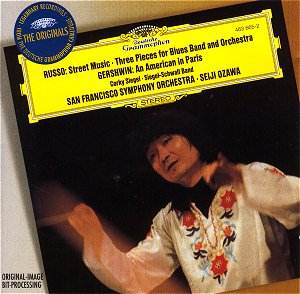Over the past eighty years or so, there have been many attempts
at combining popular and ‘classical’ elements. A few have been undoubtedly
successful, such as Milhaud's La Création du Monde or Bernstein’s
Prelude, Fugue and Riffs, some have found popular success despite
their shortcomings – Rhapsody in Blue being the obvious example
– while there are those that have been generally adjudged honourable failures,
such as Stravinsky’s Ebony Concerto (though my cat Ebony would
probably disagree).
William Russo is a jazz trombonist as well as a composer,
and his two pieces on this disc have some attractive moments. The ever-present
danger however, with this sort of hybrid, is that the styles are watered
down, or rather dumbed down, in order to achieve a satisfactory
co-existence. That tends to happen in Street Music, so that the
‘classical’ elements, mostly represented by the instrumental groupings,
seem strait-laced and have difficulty in letting their hair down, while
the jazz elements seem crudely ‘groovy’. There is, however, some wonderful
playing from the soloist, the remarkable Corky Siegel, who doubles on
harmonica and piano, producing sounds on the former that I for one had
certainly not heard before – wailing glissandi, growling tremolandos,
imitations of jazz trumpet and human voice, and so on. Great stuff,
but not enough to conceal the essential thinness and occasional tedium
of this music. I do defy you, though, to resist tapping your foot to
the catchy hoe-down rhythms of the fourth movement.
Actually, DG haven’t served the composer well, in that
the first of the Three Pieces for Blues Band and Symphony Orchestra
brings more of the same kind of vaguely bluesy moanings as begin
Street Music. How much more satisfying to have placed An American
in Paris between the two Russo pieces, thus gaining more
contrast and sparing Russo’s blushes over his two rather similarly conceived
works. That said, I find the Three Pieces, which antedate Street
Music by seven years or so, a more engaging piece. The first movement
features the jazz group playing bouncy ‘rum-ti-tum-ti’ riffs, while
the orchestra spins long slow, often quite dissonant, melodic lines
- rather like bumping along in a country bus watching grand, distant
scenery pass sedately by.
The other movements are the central one with important
solos for oboe and violin (violin soloist Stuart Canin is credited,
so why not the oboist?), and more boppy music for the finale. This is
more light-hearted and a little less strenuous than the first movement,
but uses many of the same techniques. Most of it is built over a repeated
bass riff, but there are some interesting episodes, such as the one
beginning with sinister chords in muted trombones.
The ending of Russo’s third piece pays tribute to Rhapsody
in Blue, whether consciously or not, which leads nicely into An
American in Paris. This is given a bright, colourful performance
by Ozawa and the San Franciscans, helped by a sparkling recording, which
has survived its twenty-four years or so of existence exceptionally
well; this is a really competitive version of Gershwin’s little masterpiece,
complete with honking motor horns etc., and it is a pity that it’s tucked
away amongst this otherwise unremarkable music.
Gwyn Parry-Jones


